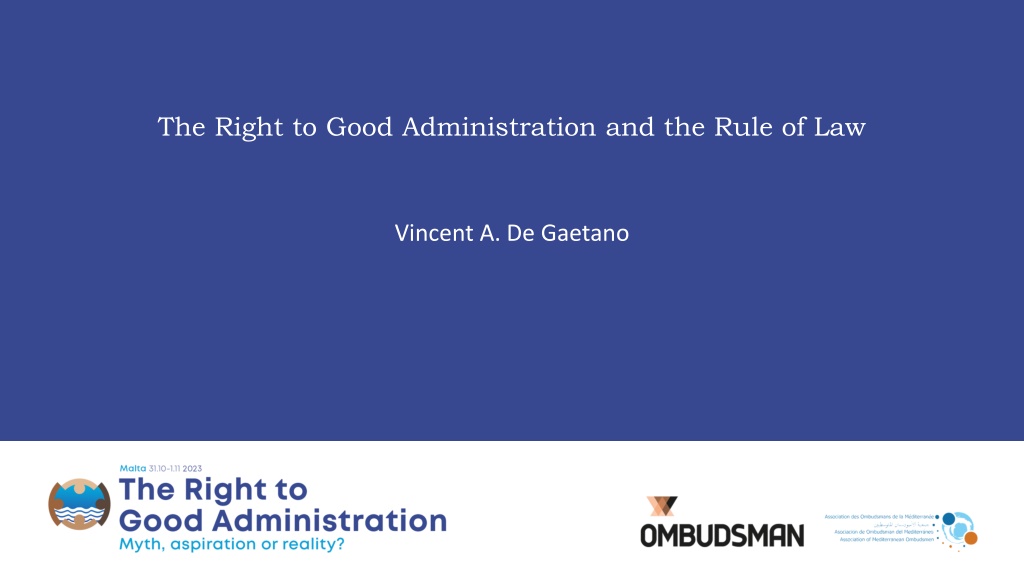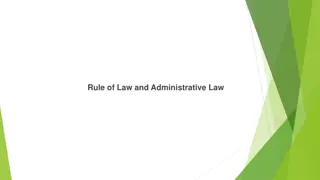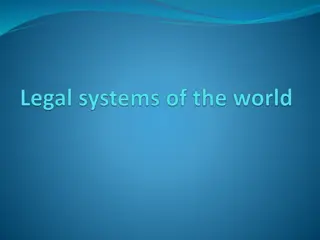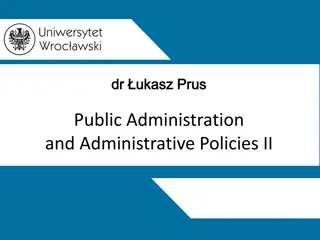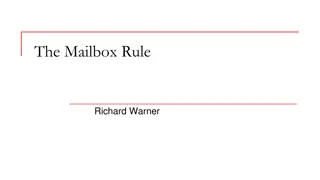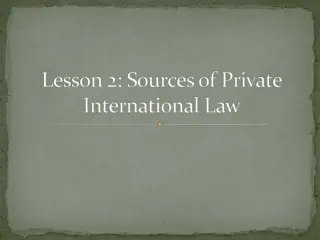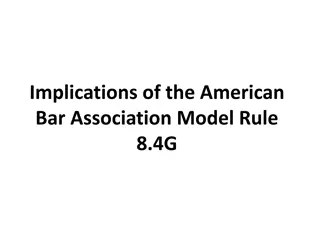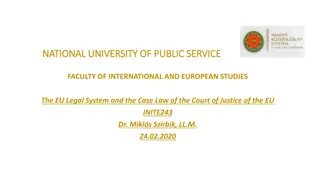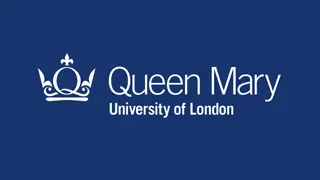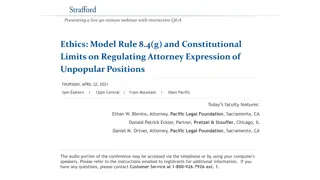Principles of Good Administration and Rule of Law
This content emphasizes key principles such as accessibility of law, accountability, just law, open government, impartial justice, separation of powers, and publicity. It highlights the importance of clear and predictable laws, equal application of laws, protection of human rights, and fair adjudicative procedures, promoting transparency, accountability, and fairness in governance.
Download Presentation

Please find below an Image/Link to download the presentation.
The content on the website is provided AS IS for your information and personal use only. It may not be sold, licensed, or shared on other websites without obtaining consent from the author. Download presentation by click this link. If you encounter any issues during the download, it is possible that the publisher has removed the file from their server.
E N D
Presentation Transcript
The Right to Good Administration and the Rule of Law Vincent A. De Gaetano
Accountability The government as well as private actors are accountable under the law. Just Law The law is clear, publicized, and stable and is applied evenly. It ensures human rights as well as property, contract, and procedural rights. Open Government The processes by which the law is adopted, administered, adjudicated, and enforced are accessible, fair, and efficient. Accessible and Impartial Justice Justice is delivered timely by competent, ethical, and independent representatives and neutrals who are accessible, have adequate resources, and reflect the makeup of the communities they serve.
1 The law must be accessible and so far as possible intelligible, clear and predictable (p. 37); 2 Questions of legal right and liability should ordinarily be resolved by application of the law and not the exercise of discretion (p. 48); 3 The laws of the land should apply equally to all, save to the extent that objective differences justify differentiation (p. 55); 4 Ministers and public officers at all levels must exercise the powers conferred on them in good faith, fairly, for the purpose for which the powers were conferred, without exceeding the limits of such powers and not unreasonably (p. 60); 5 The law must afford adequate protection of fundamental human rights (p. 66); 6 Means must be provided for resolving, without cost or inordinate delay, bona fide civil disputes which the parties themselves are unable to resolve (p. 85); 7 Adjudicative procedure provided by the state should be fair (p. 90); 8 The rule of law requires compliance by the state with its obligations in international law as in national law (p. 110).
The Democratic Process The Separation of Powers (1) The democratic process, which is not just the imposition of the will of the majority on the minority, but includes taking serious account of the will and aspirations of the minority; and (2) The implementation of laws by the agents of the State be they ever so high or so low in the hierarchy, like Ministers or the Attorney General or the Governor of the Central Bank or Permanent Secretaries or policemen or public health auxiliaries should always be subject to independent verification and check.
Publicity All serious inquiries, and all inquiries into serious matters, should be conducted in public, with adequate time and resources given to the board to delve into the matter before it, with the possibility of interested parties making submissions, and with a pre-determined undertaking by the minister commissioning the inquiry to publish forthwith the findings.
What is crucial for the Rule of Law to be effective is the genuine predisposition, the attitude, of those in any position of power to give practical effect to the functional aspects of any such definition in other words to go beyond political posturing and beyond paying lip service to its precepts.
Positive Obligations Positive obligations should extend also, in the interests of good administration, to all areas where the administration is aware, or ought to have been aware, that there is, or is likely to be, an infringement of a social or economic right the right to a safe and healthy environment, to right to sleep at night undisturbed by loud music in the streets or nearby catering establishments, the right to safely navigate our streets on bicycle, the right not to fear for your life when a building is being demolished next door. It is imperative that we start thinking of the positive obligations of the State also in this connection.
